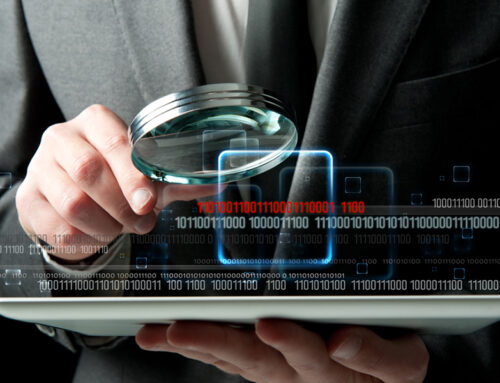Working from home is a growing option for many professionals. Eliminating the daily commute and working in a comfortable setting of your choosing can boost productivity and work satisfaction. These days, with a global pandemic raging and many companies transitioning to a remote business model to protect their employees and customers from COVID, remote work is becoming a viable option for a greater number of people in the workforce. However, with all the benefits that working from home provides, it also creates some additional responsibility for workers. Along with time management and motivation issues, the most critical of these is maintaining sufficient cybersecurity. Cybercriminals are also feeling the effects of the COVID crisis and are increasingly turning their attention to cybersecurity weaknesses common to remote working. Taking the time to identify weak points in your home network can help protect your company’s interests by safeguarding critical data and your reputation as a professional within the organization.
Click here to contact EIRE Systems for help with your next project.
Cybersecurity Issues for Remote Positions
When someone transitions to working from home, many of the security protections offered at the office are eliminated, leaving the professional in charge of protecting relevant company data. There are many options available to handle this task, but the first step requires an assessment of security shortfalls. The steps needed to reinforce your security depend on your unique situation. To get you started, here are several common areas of concern for remote employees.
- Internet access: Connecting to the internet at your place of business is generally safe due to the extensive security measures put in place to protect company data, such as blacklisted IP addresses and firewalls. There’s a good chance your connection at home doesn’t have the same level of security.
- Personal devices: Workplaces often require employees to use dedicated work devices to ensure security standards are being met. For many who are unexpectedly working from home, the temptation to conduct business on a personal device could put the company at risk.
- Email: Phishing scams are the practice of sending fraudulent emails that claim to come from reputable individuals or companies. The goal is to trick the recipient into giving personal information or unintentionally downloading malware through a malicious link. Company email accounts go to great lengths to filter out these emails, but using a device with access to your personal email account risks exposing any professional data on that device. Since the emergence of the coronavirus, phishing attempts have dramatically increased.
- Lack of a remote work policy: Some companies that utilize remote working positions have already developed dedicated policies that cover their remote workers. However, many businesses that have been forced to implement working from home unexpectedly may not have a policy in place to help guide employees through security measures.
- Password best practices: Passwords created for company networks that involve sensitive data often have specific requirements to protect the business from security breaches. When working from home, it’s possible that the passwords associated with professional activities do not follow the same guidelines.
- Use of public Wi-Fi: Working from home offers a certain amount of freedom to take work on the road. It may be tempting to pack up your laptop and head to a local coffee shop for some socially distanced time out of the house, but doing so opens you to security risks.
- Outdated software: Software companies work hard to identify the latest security threats and send regular updates to protect their customers from these threats. However, downloading and installing these updates is required to take advantage of the most current protections.
- Viruses and malware: New viruses and malware are developed over time to steal sensitive information and take over network resources. Devices that don’t use antivirus and malware removal software are at risk.
- Data storage: Unless your company uses cloud-based storage for data, you may not have access to the company’s hard drives. Choosing to store information on your device or some type of external hard drive can pose a significant security risk.
Security Tips for Working From Home
Once you’ve identified the areas of concern for your home network and remote work practices, you can take steps to reduce your risk of a cyberattack. Start by contacting a relevant representative of your company to see if there are already standards in place for those who work remotely. Ask if there is a remote work policy that covers at-home security measures, and find out what options your employer offers to assist with beefing up your security. Some companies give remote employees access to a virtual private network (VPN) to help maintain security policies and standards. Once you know the resources available from your company, you can work on resolving the issues that aren’t covered.
If possible, only conduct work on professional devices from your employer. If you’re required to use your personal devices in your home office for work purposes, check to ensure your operating system and software are all up to date. If your device is password protected, make sure the password you use meets the standards of your work passwords. Ideally, you should use a dedicated device that’s never used to access personal accounts. If that isn’t possible, make sure you don’t click any suspicious links in personal emails, and verify any unsolicited emails you receive before opening them. Have adequate antivirus software installed, and use a malware removal tool regularly to identify and eliminate any malware that has made it to your device.
Make sure your internet connection is secure. If your home network uses Wi-Fi, it should require a complex password for access. Never conduct business on a public network, and, if possible, refrain from connecting any device to public Wi-Fi network if it’s ever used for work purposes or confidential information. If your company uses cloud-based storage for professional data, always keep your work stored in the cloud rather than on your device. Backups should also be sent to the cloud, and you should avoid the use of external hard drives or USB sticks for anything work-related.
Set the Security Standard
These are unprecedented times, and many of us have been thrown into a remote work environment with little to prepare us. When it comes to cybersecurity risks, always try to set the standard with your efforts to protect the data you work with. Incorporating redundant security measures such as factor authentication could be less convenient during your daily activities, but it’s absolutely preferable to being responsible for a critical data breach because you didn’t do enough to maintain security at home.
About the Author: EIRE Systems
EIRE Systems is a leading independent provider of professional IT, AV and Access Security services to the financial, insurance, manufacturing, health care, retail, construction, hospitality, commercial real estate, legal, educational and multinational sectors in Japan and throughout the Asia Pacific region. EIRE Systems has expertise across a wide spectrum of Information Technologies, with a track record for successfully completing hundreds of assignments since its establishment in 1996.



